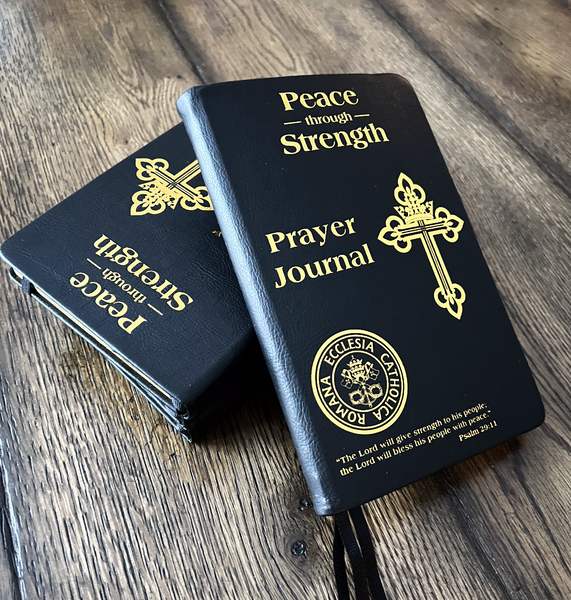Day 3 – 90 Days to Liberty
by Fr Richard Heilman | March 1, 2023 3:00 AM
My Morning Prayer Sampler
For me, it starts by clearing the cobwebs. I jump out of bed and I am into the shower, get dressed and pour myself a nice cup of coffee. I want get up at a time when I don’t feel rushed to meet my daily duties. Mornings (after a shower and my first few sips of coffee) are quality time for me. It’s uninterrupted time with just me and my loving God. After a few minutes of quiet time, I begin my prayer.
5:20am – Morning Offering[1] (30 seconds)
5:21am – Spiritual Reading: “Freedom from Treason” (below) by Fr. James Altman (4 minutes)
5:25am – Mental Prayer. Using my Peace Through Strength Journal[2], as I sip my coffee, I pray the Preparatory Prayer found in the journal as I spend the first few minutes speaking to God. This can include what or who you are praying for today. I write this in my journal. Then I just sit quietly, allowing today’s spiritual reading to resonate in my heart, while I listen for anything God wants to speak to my heart, which I can write in my journal. Then I pray the Closing Prayer found in my journal. (15 minutes)
5:40am – Pray the Rosary. During these 90 Days I am so looking forward to the peaceful offering of the rosary by Doug Barry in the video below. (19 minutes)
6:00am – Pray the Angelus (1 minute)
Then I spend some time reflecting on today’s readings for Mass, and I am off for a brisk walk with my dog, Gracie (still reflecting on today’s readings). Then, it’s time to head to Mass.
There you have it, like Jesus spending 40 days in prayer in the desert, defeating the devil, we dedicate ourselves to just 40 minutes of prayer each morning, cultivating our love for our Lord and our Lady, filling the house of our soul with their love and God’s grace, which brings peace. Now I am well-prepared to live my day for God, not for me.
Our Daily Prayer for Liberty and for a Holy Spirit Revival
“Free us from every force of oppression, both internally and externally. Grant to our leaders the wisdom to protect and promote our liberties; by your grace may we have the courage to defend them, for ourselves and for all those who live in this blessed land. Heavenly Father, grant a Holy Spirit Revival in our land!” (Based on a prayer by the USCCB)
“Freedom from Treason” by Fr. James Altman
Dear family, the very word “treason” stirs a fundamental loathing within us toward the traitor. Nobody likes a traitor, a betrayer. Indeed, as to the greatest traitor of all time, the betrayer of the Son of God, Jesus Himself said “… woe to that man by whom the Son of Man is betrayed. It would be better for that man if he had never been born” (Matthew 26:24).
The common understanding or definition of traitor is criminal disloyalty, typically to the state. It is a crime that covers some of the more extreme acts against one’s nation or sovereign. Perhaps the most ancient figure that exemplifies treason is Brutus, who betrayed Julius Caesar, through whom Shakespeare had utter the famous words “et tu Brute?” – “and you, Brutus?” – even you, Brutus, my friend? Remember such similar, chilling words, spoken 2,000 years ago, “Judas, are you betraying the Son of Man with a kiss?” (Luke 22:48).
As Americans – at least before the current historical revisionism – we have known since schooldays what to think of treason. We were taught what to think through classic examples that, like every good parable, imparted to us the sense of right and wrong. On the one hand, we learned of the betrayal by Benedict Arnold, whose name has become synonymous with treason. Benjamin Franklin wrote that “Judas sold only one man, Arnold three million.” On the other hand, we learned of the glorious sacrifice of Nathan Hale who, as he stood before the British gallows, uttered the renowned words “I only regret that I have but one life to lose for my country.”
Who can forget the brave witness of faith of Bishop St. John Fisher who refused to apostatize himself before the malevolent King Henry VIII, whilst the rest of the cowardly episcopacy bent to the will of a mere human? Who can forget the more recent brave witnesses of the Mexican clergy-martyrs, like Blessed Miguel Pro, or the incomprehensibly brave 14-year-old boy, St. José Sánchez del Río?
It all fits together … the secular revulsion we have toward the “Benedict Arnolds” of the world, and the revulsion we have toward the “Judases” who betrayed us in the Faith. It certainly explains the revulsion that the faithful had for the grave betrayal of the abuse scandal. It was bad enough that abuse occurred in the first place; it was immeasurably worse when certain members of the hierarchy covered it up; it was much worse than that when others who knew stood by and did nothing; and worst of all when some of the hierarchy themselves were perpetrators. The grave consequences to the faith of the faithful are well known.
But it is easy to blame those we readily identify as Judases. It is a lot easier to point the finger at other particularly evil traitors, but what about us? Let us never forget the parable Jesus taught about those who were convinced of their own righteousness. How often are we like the Pharisee who took up his position in the temple “and spoke this prayer to himself, ‘O God, I thank You that I am not like the rest of humanity — greedy, dishonest, adulterous — or even like this tax collector’” (Luke 18:11).
The fact is that we all have been traitors. In fact, we all are traitors, to a greater or lesser extent maybe, but traitors, nonetheless. Every single time we betray the Sacrifice on Calvary…traitor. Every time we sin, in what we have done and in what we have failed to do…traitor. We betray the Cross of Christ every time we refuse to pick up our crosses and follow Jesus to our own personal Calvary. For today, let us look at what might be the most insidious way we betray Jesus — in what we have failed to do.
As the great Archbishop Charles Chaput once said: “For Pope Benedict, lay people and priests don’t need to publicly renounce their Catholic faith to be apostates; they simply need to be silent when their baptism demands that they speak out, to be cowards when Jesus asks them to have courage.” So, what about us? What about our own treason?
Dear family, in our politically-correct-poisoned culture, we are stigmatized, chastised, and ostracized when we try to live out our Faith publicly. We are hammered by the proposition that we are being “judgmental” when we stand up for the truths of our Faith. Yet, if we speak up and speak out about the unchanged and unchangeable truth about sin, and endure the repercussions for doing so, should we not have the same attitude as Jesus to the temple guard? — “If I have spoken wrongly, testify to the wrong; but if I have spoken rightly, why do you strike me?” (John 18:23).
Let us pray this day to be free from treason – from highest treason – against Jesus our Lord, in what we do, but perhaps even more, in what we have failed to do. Too many times we have remained silent when our baptism calls us to stand up and speak out against sin in the world. Indeed, dear family, we will know we have gone spiritually blind when we can see nothing significantly wrong with something that God has called sin. (From “Let Freedom Ring[3]“)
You can enlist in the United States Grace Force HERE[4] (please recruit family and friends!)
Information on the United States Grace Force can be found HERE[5]
We highly recommend ordering the book “Let Freedom Ring[3]” authored by Fr. Bill Peckman, Fr. James Altman and Fr. Rick Heilman. This amazing book will be a great tool for easy access, highlighting and bookmarking as you traverse through the first 40-days of our 90 Days to Liberty journey with tens of thousands of other special forces prayer warriors!
You can order the book at RomanCatholicGear.com[6].
You may want to consider using the Hallow App for Lent: Hallow.com[7]
GET YOUR PEACE THROUGH STRENGTH PRAYER JOURNAL …
HERE[8]
 [9]
[9]

- Morning Offering: https://usgraceforce.com/morning-offering/
- Peace Through Strength Journal: https://romancatholicgear.com/collections/grace-force
- Let Freedom Ring: https://romancatholicgear.com/collections/books/products/let-freedom-ring-book
- HERE: https://visitor.r20.constantcontact.com/manage/optin?v=001ESuSGaJpYPCG2iUdd4j4bkKwd4gkh2ZUVbam_Ty9rCn6blH6_U3cI2D8UvSLEcSzHnC4eq2UWmK1I0SbEw0SPKqnkZ2j0Z4J4D-_m4dD6CKJU9day-bBa8Qnx4dv7RLDIVlYAjL1JWsjfUTNPH2jQIVY9gbdbz4O4oMIzv5V1dT_upQsD8cX86iq_5Y-x4eLrTVtdOmA24s%3D
- HERE: https://usgraceforce.com/god-wants-you-enlist-in-the-grace-force/
- RomanCatholicGear.com: https://romancatholicgear.com/collections/grace-force
- Hallow.com: https://hallow.com
- HERE: https://romancatholicgear.com/collections/peace-through-strength-1
- [Image]: https://romancatholicgear.com/collections/peace-through-strength-1
Source URL: https://usgraceforce.com/day-3-90-days-to-liberty/